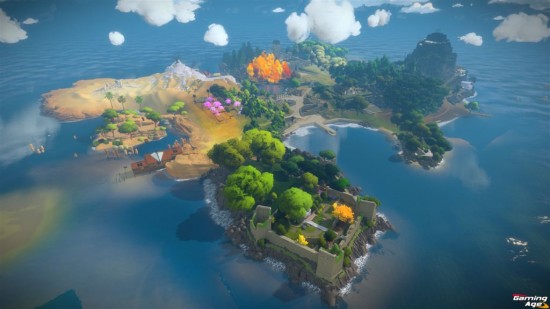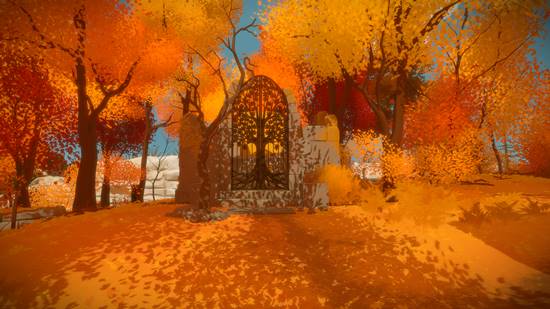Also On: PC
Publisher: Thekla
Developer: Thekla
Medium: Digital
Players: 1
Online: No
ESRB: E
Several hours and countless puzzles into The Witness, I was hit by a realization: I don’t care about any of this.
In my defense, this may be because I’ve never once in my life wondered about how Jonathan Blow’s mind works, and that’s pretty much all The Witness is: an exploration of how he, Jonathan Blow, wants you to solve puzzles.
Or not, of course. If there’s one thing I got from The Witness, it’s that if Blow buys into the notion of creator-as-God (and based on the fact he spent seven years making a game entirely about his heuristic approach to puzzle-solving, I’m thinking there’s at least a teensy bit of that thinking in his work), he views himself as a cold, indifferent God (basically, think Deism, but applied to video games). At least, that’s the only way I can understand why someone would go to the trouble of creating a game with more than six hundred puzzles, and then make it so that the only way to solve them is if you can think precisely the way Blow wants you to think. This takes away any room for ingenuity or creativity, and in the process the game also removes the thrill of discovery. There are no “A-ha!” moments, just points when you figure out what the creator intended you to do. Maybe I’m just letting my feelings regarding authorial intent color my perceptions here, but I just don’t see what the fun in that is.
Let me be clear on a few points. I don’t mind games that are artsy; I loved Proteus, which was basically an 8-bit predecessor to The Witness, only without any puzzles (in other words, it too was a game in which you walk around an island with no instructions whatsoever). I don’t have an issue with so-called walking simulators, either — Everybody’s Gone To The Rapture was easily my favorite game of last year, and it consisted of little more than walking around (at a much slower pace than you do here!) and looking at flashing lights. And seeing as Portal and Professor Layton are two of my favorite franchises of all time, it should go without saying that I don’t mind if a game consists of almost nothing but puzzles. (I should also add that I had zero opinions, good or ill, about Blow going into this game.)
So why does The Witness fall so spectacularly short for me? Basically, you just need to see where those last two paragraphs intertwine. In contrast to those other games I mentioned that seem to exist in vibrant, lived-in universes, The Witness feels like one long, boring puzzle-delivery mechanism. It certainly looks spectacular at first, but the moment you discover that you can only color inside the lines that Blow has set out for you — that you can never walk off a slightly high ledge, or fall off a narrow bridge, or walk through the island’s colorful foliage — is the moment it all starts to feel a little empty. Blow can scatter however many “deep” quotes and cryptic FMVs throughout the game he wants, but none of them do anything to dispel The Witness’ overarching, all-pervasive feeling of cold sterility.
I have to admit, my feelings towards the game’s look and feel surprised me, too. After all, if you’ve only seen screenshots from The Witness, it probably seems like The Witness is gorgeous — in fact, I totally felt that way at first glance, too. But as I played through the game and got more and more annoyed by…well, pretty much everything, The Witness’ glossy exterior just started feeling cold and sterile. Rather than digging down deep into the game and discovering its heart, here you dig down beneath the puzzles and just find more variations of those puzzles.
For whatever reason, the one word that keeps coming back to me with The Witness is “solipsism” — or, perhaps more accurately a kind of reverse solipsism. After all, if the strict definition of the concept is that one’s own mind is the only thing that can be known to exist, then The Witness is a testament the notion that Jonathan Blow’s mind is the only thing that can be known to exist. That may appeal to some, I guess, but if this game is anything to go by, it’s my idea of hell.



